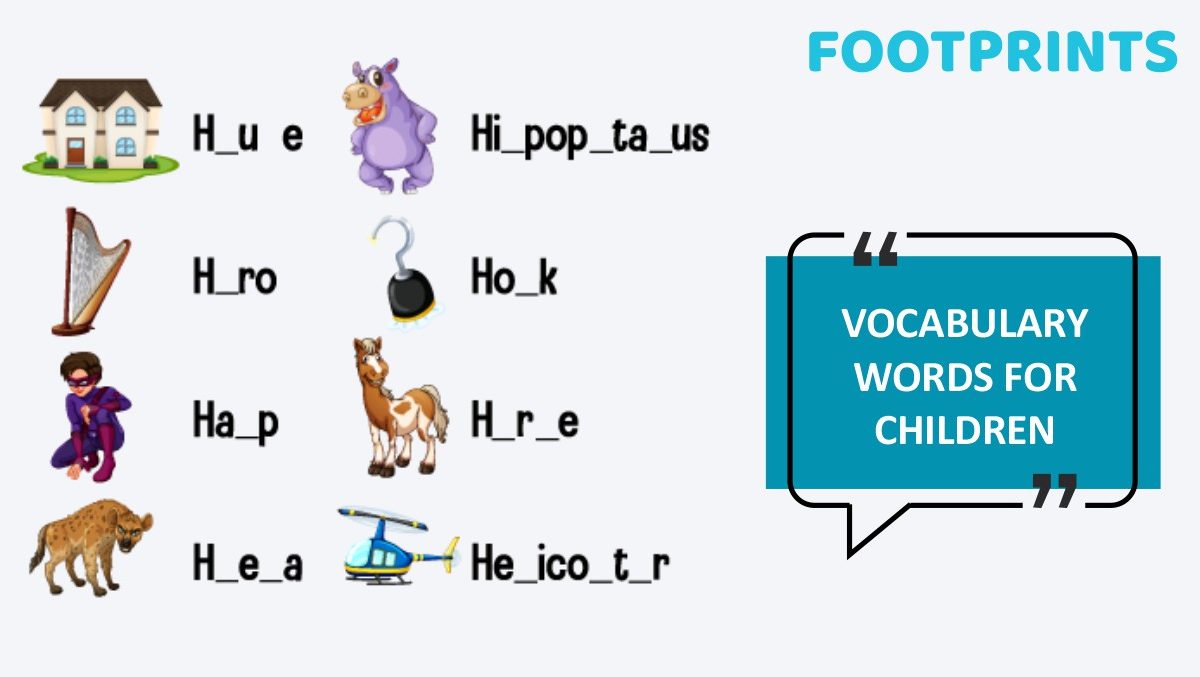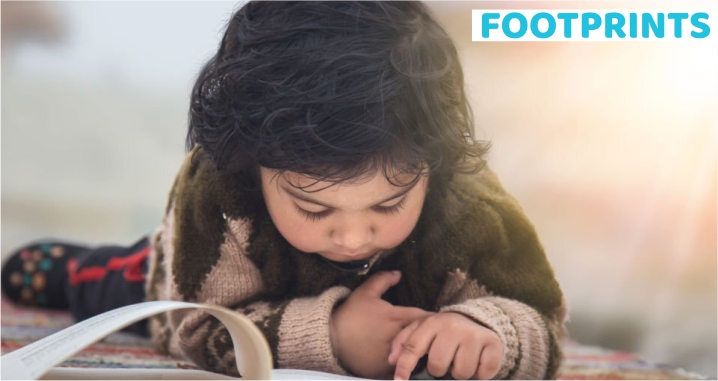
The fundamental units of communication are words. They allow us to communicate our ideas, feelings, and thoughts, and they are crucial in forming how we perceive the world. Did you know that when children begin understanding words in the first year of life, their vocabulary rapidly increases? To an extent, at age one, children recognize about 50 words; by age three, they realize about 1,000 words; by age five, this number jumps up to as many as 10,000 words. Of course, the more they are exposed to language, the better their vocabulary skill improves.
If you are keen to know what some of the vocabulary words you should expose children to, here is a handy list:
Vocabulary Words for Preschoolers
At the preschool level, you can introduce children to the below-mentioned words. How can you do that? Have a conversation and include these words in that. For instance, if you ask a preschooler what he is holding in his hand and he says “car,” pointing to his toy car, you will have to respond, “Yes, that is a red car. It rides fast.” Therefore, you can notice that just by adding a sentence, you will immediately add two new words to your child’s list of vocab which will intentionally and progressively improve the child’s language skills.
| Ran | Man | Her |
| Here | Dog | Him |
| Cow | Home | Fat |
| Good | Ride | His |
| Day | Cat | Like |
| Car | Box | Hot |
| Play | Ball | Cold |
| Bed | Yes | Book |
| Pan | No | Far |
| Fun | One | Tree |
Vocabulary Words for Grade 1
| Bat | Cake | Train |
| Bee | Candy | Who |
| About | City | Why |
| Add | Child | Rock |
| Bill | Brown | Room |
| Bird | Brother | Seem |
| Ate | Club | Seen |
| Ask | Dear | Little |
| An | Deep | Jump |
| As | Doing | Inch |
| Ago | Change | How |
| After | Down | Very |
| Buy | Dress | Walk |
| Bus | Drop | Wing |
| Base | Door | Wish |
| Blue | Doll | Your |
| Black | Call | Yet |
Vocabulary Words for Grade 2
| Dear | Mumble | Instead |
| Huge | Enormous | Attention |
| Worried | Special | Prefer |
| Positive | Miserable | Ignore |
| Grumpy | Embarrassed | Annoy |
| Wonder | Searching | Almond |
| Ordinary | Measuring | Arrest |
| Gigantic | Disappointed | Backbone |
| Warning | Respect | Base |
| Opposite | Lovely | Custard |
| Frustrated | Discover | Dance |
| Uncomfortable | Rhyme | Customer |
| Observing | Listen | Blister |
| Focus | Directions | Butter |
Needless to say, vocabulary words need to progressively increase in number and complexity. For instance, by the time the child is in Grade 2, he or she could be introduced to the following words.
While the above implies an indicative list of words, here are a few handy activities to help children learn new words and improve their language skills.
Conversations
One of the best ways to help develop children’s vocabulary is for them to be in a language-rich environment. Initiate conversations with your child, describing situations, emotions, thoughts, etc. While you need to keep the vocabulary age-appropriate, the child will pick up several new words if he or she continues to hear them being used. The next time you visit a supermarket or travel, simply talk about what you see.
Pro tip- When speaking with children, we often dumb down our vocabulary or think that easy talking would help them better understand. However, this act will automatically slow the learning process of proper pronunciation.
In addition, remember that you should have an actual conversation with your child rather than following a path of monologues. An excellent way to do that is to keep your questions open-ended, encouraging the child to think of words and put their thoughts into words. The more practice they will do, the more confident they will be.
A strong vocabulary isn’t just about knowing many words; it’s about understanding their meanings and using them effectively in various contexts. Initiating conversation with your children will nurture an open parent-child communication bond.

Reading
There is no better way to build a child’s vocabulary than to read to them. The more they are exposed to new words and hear the word and its usage, the more they will find a place in their vocabulary.
Allow the child to choose what they read or what they want to read to them. When the subject is of interest to them, they are likely to absorb new words they encounter. It is a significant advantage that they will also develop a lifelong love for reading.

Missing Vocabulary words
Based on the new words that you may have taught them, it will be a great idea to play a fun missing vocabulary word game. You could offer them simple sentences with a missing word. Seeing the light in their eyes as they supplement the disappeared word will be a pleasure.
Word of the Day
Introducing the child to a new word every day will also be a good idea. The word should be age-appropriate. Remember to share the meaning of the word and its popular usage for the child to imbibe it.
Roll a Dice
Once you have introduced some new words to the child, you could also play the Roll a Dice game, where the dice represent six vocabulary activities as below:
- Meaning of the word
- Its usage in a sentence
- Opposite of that word
- Rhyming word
- Draw the word
- Enact it
This can be a fun game as you roll the dice, and the child takes to responding to a different aspect of the word.
Bring new words to life
Each time you have introduced a new word, try to find its picture or usage somewhere. For instance, if the word you submitted to the child is an emotion and you find an image where the person is displaying that emotion, it will be an excellent way for the child to see that word come to life. This way, the word isn’t just an academic exercise for the child but a part of life.
Repeat, repeat, repeat
Remember that for a word to register with the child, he needs to encounter it several times. This will enable the word to settle into the child’s long-term memory and get added to their vocabulary.
To Sum Up
The significant bit when it comes to improving children’s vocabulary is for them to be in a language-rich environment. At Footprints, a preferred preschool and daycare chain that has emerged as a parenting partner, we follow the scientifically developed HighScope Curriculum Communication. Among other things, the curriculum allows for language development in the context of trusting relationships. There are opportunities throughout the routine where the child is encouraged to express their thoughts. Active listening and asking open-ended questions are vital to the child’s language development.
Here’s to raising a generation of empathetic listeners and good communicators.
Aditya brings over ten years of expertise as a Senior Marketing Strategist. He’s an expert at developing captivating marketing tactics that regularly provide excellent outcomes. His innovative strategies have demonstrated a track record of increasing organizational reach and engagement, showcasing his extensive knowledge of the contemporary marketing landscape.


